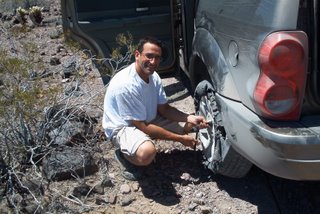Page added on May 30, 2004
The die-off begins at the bottom

This one is from my local paper. Looks like the people on the bottom rung are already starting to feel the squeeze.
Growing requests for help surprises N.C. charities
CHARLOTTE, N.C. — Social workers and charities say rising gasoline and utility bills have sent more people into financial crisis during April and May, usually the slowest months of the year for agencies that help poor people.
At the crisis agencies in Charlotte, Hickory and beyond, the need for food, clothes and financial aid now matches winter peaks.
“We’re already dealing with a population that lives paycheck-to-paycheck,” said Carol Hughes, executive director of Crisis Assistance Ministry in Charlotte.
Normally, spring is catch-up time for the nonprofits. People have more cash thanks to tax refunds, and expenses drop after a cold winter.
But this spring, gas prices have soared to record highs. Hot weather quickly followed a cold winter, skipping the mild days that allow struggling workers to save on utility bills.
At the Mooresville Christian Mission, the number of people seeking help in May more than doubled from a typical month. Lines sometimes form 30 minutes before the agency opens.
The Cooperative Christian Ministry of Greater Hickory has helped almost 500 people this month, nearly 200 more than last May.
A social worker at the Salvation Army of Gaston and Lincoln Counties said she does 20 interviews a day with people needing financial help, but she still must turn away 10 more.
“We’ve never fed this many people in May,” said Beverly Howard, director of the Charlotte charity Loaves & Fishes, “so we don’t know what the summer will bring.”
The high demand for aid could increase further as summer arrives.
Low-income students out of school for the summer no longer receive free and reduced-price meals.
In June, unemployment benefits will begin running out for about 2,000 laid-off Pillowtex Corp. workers.
While many are able to shrug off rising gas prices, inflated fuel costs hit poor workers, who often drive older cars with less fuel efficiency.
Tara Torrence said it costs about $40 more a week to keep her Mitsubishi Mirage filled. As she struggles with her rent, she has also had to cut back on groceries for her two kids.
“They’re tired of hot dogs and pizza and bologna,” she said.
For the past four to six weeks, caseworker Yolanda Lee said utility bills have come up as another reason the poor have fallen behind this spring. She said she has heard the same thing in the people seeking help she interviews every day at Crisis Assistance Ministry: “`My bill has never been this high.’”
Charlotte had below-average temperatures in December, January and February at a time when natural gas bills were 10 percent to 20 percent higher than the previous year. And unlike last year, when the city didn’t record a 90-degree day until July 8, there have been five this year.
Lee said some clients pay as little as $50 for their subsidized housing, but their natural gas bills cost as much as $300. The poor often live in homes with little insulation, further driving up the cost.
Lee met Friday with Marlene Kirkpatrick, who works full time as a hotel housekeeper for $7.25 an hour. Kirkpatrick said she twice missed a few days of work: for pneumonia and to visit her father shortly before he died.
But what sent her to Crisis Assistance was this year’s total increase of $900 in her utilities.
“I was caught up with my bills, everything was going fine, and then we had that real cold winter, got slammed with snow,” Kirkpatrick said. “I couldn’t catch up.”


Leave a Reply